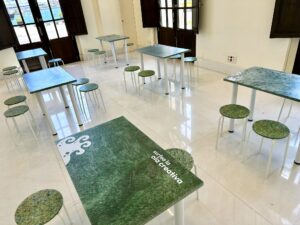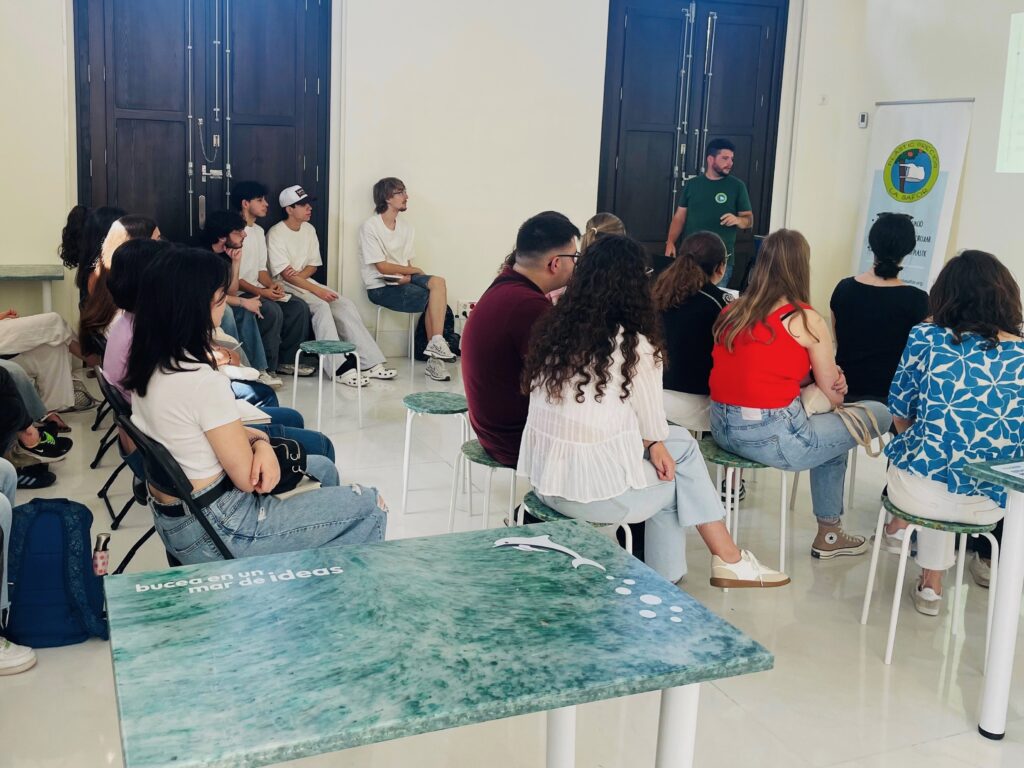
- The AIMPLAS Institute has given the Port Authority of Valencia 20 stools and six tables made from the remains of marine nets abandoned in the oceans.
- The new furniture will be fully integrated into the day-to-day activities taking place in the Clock Building of the Port of Valencia.
València, 7 June 2024.- Remains of fishing nets lost at sea have returned to the Port of Valencia converted into chairs and tables; into tangible elements of daily use that are already being used in the Clock Building to develop workshops with children and adults in the exhibitions that the Port Authority organises throughout the year. This is thanks to the transfer of the furniture to the port by AIMPLAS, the Technological Institute of Plastics, within the framework of the INNORAP project.

According to AIMPLAS, around 640,000 tons of lost or abandoned fishing nets end up in the oceans every year. At the same time, it is estimated that approximately 7.5 million tonnes of textile waste are generated annually in Europe. Abandoned fishing nets are an environmental problem in relation to marine litter and textile waste is one of the most voluminous waste streams of household origin. In both cases, there are no efficient and comprehensive collection, management and treatment models for these two types of waste in Spain.
To address this problem, AIMPLAS, the Technological Institute of Plastics, launched the INNORAP project, the aim of which is to develop a pilot system for the management of textile and fishing net waste in the Valencia Region. This system is based on the application of Extended Producer Responsibility, in which the roles, competences and responsibilities of each agent involved are established, as is already the case with other types of waste streams, such as packaging, medicines or used industrial oils.
According to Sonia Albein, Circular Economy researcher at AIMPLAS, ‘in this project, in addition to considering the processes and technological developments that have been shown to be valid for the management of these two waste streams, we are focusing on the final recovery of the waste. To this end, we are undertaking research and development of specific recovery routes, such as advanced mechanical recycling of complex waste and chemical recycling.
From marine litter to furniture
Thus, within the framework of the project and in collaboration with Plàstic Preciós La Safor, stools, tables and key rings have been made from marine waste. Specifically, 20 stools and six tables have been donated to the Clock building in the city of Valencia, and 200 key rings have been distributed among those attending the environmental education workshops held as part of Marlice 2024, the 3rd International Forum on Marine Litter and the Circular Economy, held in Valencia.
It is a piece of furniture that is already being used with full normality by the Port Authority of Valencia (APV) in the needs that arise in the events of the Clock Building, where they are perfectly visible to the public.
The APV’s Board of Directors approved, at its last meeting held on 29 May, to accept the donation made in its favour by the ASOCIACIÓN DE INVESTIGACIÓN DE MATERIALES PLÁSTICOS Y CONEXAS (AIMPLAS). The INNOPARC project has involved an investment of 230,000 euros and has been financed by the Valencian Institute of Competitiveness and Innovation (IVACE) and with FEDER funds.

